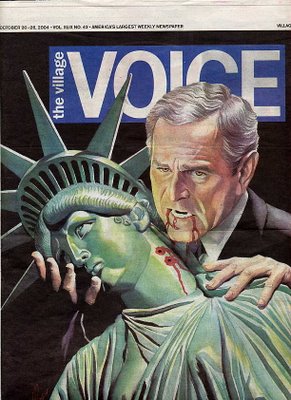 The following is excerpts from an interview about widespread sexual harassment and rape by military recruiters:
The following is excerpts from an interview about widespread sexual harassment and rape by military recruiters:AMY GOODMAN: Martha Mendoza joins us now. She is the Pulitzer Prize-winning A.P. reporter who conducted this investigation into military recruiting and sexual misconduct. We invited a representative of the Pentagon to join us, but they did not respond to the request. Martha Mendoza, welcome to Democracy Now!
MARTHA MENDOZA: Thank you, Amy.
AMY GOODMAN: Can you lay out your findings?
MARTHA MENDOZA: Yes. It took about six months for us to do enough Freedom of Information Act work, as well as interviews. We read journals from a victim who had been victimized by a recruiter. During this time, what we found was more than 80 military recruiters had been disciplined in 2005 for sexual misconduct with potential enlistees. These cases were across all the branches of the military, and it took place all over the country.
AMY GOODMAN: Can you talk specifically about the numbers? You start your piece by talking about a hundred women. Talk about the time frame. Talk about the cases we know and what you suspect about the cases we don't know.
MARTHA MENDOZA: Sure, there was a hundred young women. Most of them were between 16 to 18 years old. One important thing to point out here is that this is a rate of one out of every 200 frontline recruiters who was disciplined for this, not just charged. What we found in our review is that these were mostly students, high school or college students. Most of them were thinking about recruiting, and that the misconduct usually took place either in recruiting stations, in recruitersÂ’ apartments, or in government vehicles. It's a unique relationship, where recruiters are allowed to be alone in a closed room or closed car with a young woman. It's rare in the world of counseling and coaching and teaching that you would find that.
AMY GOODMAN: The level of military response to the complaints?
MARTHA MENDOZA: Most of the cases are handled administratively, almost all of them, so that recruiters can be demoted, they can get letters of reprimand, they can be fined. On occasion, civilian courts, civilian prosecutors will step in and also take cases, and there are a small percentage of court martial and severe penalties imposed in some of these cases.
AMY GOODMAN: Can you tell us more about the first clip we played? That's Barry Vogel, representing a 17-year-old teen.
MARTHA MENDOZA: Yes, in this case there was a recruiting station in Northern California, where there was several recruiters who have since been charged and taken out of the Marines for what appeared to be a pattern in that office of sexual misconduct with potential recruits. And in that case, things got so bad that at one point there were three recruiters having sex in the front recruiting room office with three young women, all potential recruits. Many of the victims in that area said that they were being told if they wanted to join the Marines, they were going to have to have sex with these recruiters.
AMY GOODMAN: And how did you learn this?
MARTHA MENDOZA: I came across this entire story by talking to an attorney who was representing two young women who claimed to have been raped by recruiters, and he said he felt that there was more than just these two cases.
AMY GOODMAN: And what does it take for a young person to come forward and talk about their experience? I mean, you're talking about the end there, where they're suing.
MARTHA MENDOZA: They're extremely traumatized. In fact, this morning I'm planning to interview another young woman who was victimized in this way. They are traumatized for years. They are frightened of authority. The young women who do come forward and do something about this are courageous. They are preventing it from happening to someone else, and they mostly live in small communities, where if this plays in their local paper, even if their name is not included, it's tough to protect their anonymity.
AMY GOODMAN: We're talking to Martha Mendoza. She is a Pulitzer Prize-winning A.P. reporter, national investigative reporter, who has come out with an expose on military recruiters and the increasing incidence of sexual misconduct. Can you tell us about Shedrick Hamilton, the man we just saw and heard in prison now? I think his sentence is 15 months. Tell us about his case.
MARTHA MENDOZA: He was charged with a handful of counts of rape. He was from Upstate New York. He was a recruiter who had been serving in the Marines for seven years. In this case, the charges were reduced to a third degree rape, and he says he's very, very remorseful about what happened. He realizes that his life has been ruined, his military career, his family. And he also says that he's very sad about what became -- what happened to his victim, who was a 16-year-old girl at the time.
AMY GOODMAN: How do these recruiters meet these young women?
MARTHA MENDOZA: Well, under the No Child Left Behind Act in 2002, public schools have to provide lists of all the names and phone numbers of their students, and in many cases, emails as well and cell phones as well, to the military recruiters. If they don't provide these lists, then the schools do not get federal funds. And unless the parents or the students go through a special process to opt out of being included on this list, the recruiters have unprecedented access to young people right now. And they are on high school and college campuses, of course, just like any other employers allowed on a high school or college campus.
And they develop relationships with the young person they're trying to recruit. They learn at recruiting school to build trust and develop a close relationship. It's very hard on the recruiters, who are working teenage hours, and I want to be clear that there's many good recruiters out there who are doing their jobs as diligently as they can. Right now is a very tough time to be a military recruiter, because of the war in Iraq. It's making it less likely that people are going to want to enlist.
AMY GOODMAN: Looking at the Indianapolis Star, they did a report how in Indiana, six female high school recruits were sexually assaulted by a recruiter in 2002, 2003. Indiana National Guard Sergeant Eric Vetesy, quote, "picked out teens and young women with backgrounds that made them vulnerable to authority. As a military recruiter, he had access to personal information, making the quest easier.” The local prosecutor noted that, of the victims, young women between the ages of 17 and 21, “most were in single-parent families with no father figure. Because Vetesy assembled [the] background information on each recruit […] he was able to target those he most likely could coerce."
MARTHA MENDOZA: Sergeant -- it's pronounced Vetsy -- has not had his trial yet. It's going to be in early 2007. The charges are by far the most egregious of any of the cases I came across. He was charged with throwing girls up on counters and being very forcible and very rough with very young girls. His case is remarkable in that there were 31 different counts, and that the prosecutor, in addition to charging rape and sexual assault, is charging a racketeering charge, because they're saying he abused his position of official power.
One thing that is also interesting about Eric Vetesy's case is that Indiana Army National Guard didn't just sit on their hands and say, this is a problem. They have instituted what I believe is the only program in the country called "No One Alone." Male recruiters cannot be alone in offices, cars or anywhere else, with female enlistees. If they are, they risk immediate disciplinary action. They will also be disciplined if they hear of another recruiter's misconduct and don't report it. And the director of the Indiana Army National Guard says that just a year into this program, they're having a lot fewer problems. He said it's almost like we're changing the culture in our recruiting.
AMY GOODMAN: Can you talk about how you get information, Martha Mendoza? I mean, you're talking about the Army, the Marine Corps, the Navy, the Air Force. How centralized is this information about the number of cases of sexual abuse?
MARTHA MENDOZA: Well, I thought it was going to be easier to get the information than it was. I began with very routine Freedom of Information Act requests to the Defense Department, which immediately told me they don't oversee and coordinate recruiter misconduct or any type of these cases. I then sent out individual Freedom of Information Act requests to the Army, Marine Corps, Navy, and Air Force, and found that part of the problem here may be that nobody is tracking these cases.
So, in the end, I did dozens of Freedom of Information Act requests and found myself having to track down who might have pieces of information about court martials, which are kept in one area, and disciplinary reprimands, in another area, and myself provide the Freedom of Information Act researchers in those branches of the military with who they should contact within their own military organization to get me the numbers that I was requesting.
So, a big piece of this story was getting the numbers. I went into it wondering, well, were there two cases that this attorney is suing over and that had been played out in a military court, or were there more? It surprised me to find 80 military recruiters disciplined in 2005. That was a much higher number than I think anyone had anticipated.
But in addition to the numbers, it was a case of trying to get people to talk to me about it. I wanted to understand from a victim's perspective how this could happen, and I wanted to understand from recruiters' perspectives, as well. So I spent time following recruiters at their work, and, as you saw, I interviewed recruiters who have been charged and disciplined. I spent a good deal of time talking to victims, as well, and to sexual assault experts about these cases.
AMY GOODMAN: And how does this affect the recruitment of young women into the military?
MARTHA MENDOZA: Well, I don't know. That will come to pass. You mean, in terms of young women who are being victimized during the process?
AMY GOODMAN: Yes, and then others who hear about it. In fact, a GAO report came out on this, Government Accountability Office report, talking about just one of these stories and how it infects the whole community.
MARTHA MENDOZA: Yeah, I think certain recruiting offices and certain recruiting officers do get reputations. It's hard for me to quantify what it is that's making it very difficult for recruiters these days to meet their numbers that they're supposed to be meeting. One interesting number I came across was that half of the 16 to 24-year-olds in this country are not eligible to be signed up for the military at this point, due to their test scores or to their education, so the recruiters have a much smaller pool to even seek from right now. I should mention that the GAO report you talked about there came out last week, and what it showed was that overall recruiter misconduct, and that's signing people up and not telling them the truth when they're doing it and other types of wrongdoing, has increased from 400 cases in 2004 to 630 cases in 2005.
AMY GOODMAN: We're hearing about increasing number of women who have suffered. On June 15, police in Eugene, Oregon, arrested a 21-year-old Army specialist for refusing to return to fight in Iraq. You may be familiar with this case. The soldier is named Suzanne Swift. She served in Iraq for a year but decided this time she could not return. Like thousands of other soldiers, she went AWOL. Not only did she feel that the war lacked purpose, but she said her superiors repeatedly sexual assaulted and harassed her while she served in Iraq. She ultimately remained AWOL until June, when the Eugene police knocked on her mother's front door. It was 10:30 at night. Suzanne was arrested, taken to the county jail. Then she was transferred to Fort Lewis in Washington, forced to return to her unit, but barred from leaving the base. Do you know the story of Suzanne Swift, now trying to get out of the military, accusing her superiors of harassment?
MARTHA MENDOZA: Yeah, I am familiar with her case. I haven't done any reporting into it. I have done a fair bit of reporting into people who are trying to get out of the military right now and how those numbers are increasing -- the conscientious objectors, as well as people who are getting out for other types of reasons: weight, drugs, alcohol. Her case is unique in that I'm not sure she made an attempt to get out through one of the official channels. I think she was victimized and traumatized, and I -- you know, I don't -- I haven't interviewed her, and I haven't read the case files on it.
AMY GOODMAN: Are you going to follow up this A.P. expose with another?
MARTHA MENDOZA: Well, that's my job, luckily. I'm very fortunate at the A.P. to have a role where I get to do a lot of investigative reporting, and on this story I believe the follow-up, the next step, is going to be that in Congress there's people calling for increased penalties for sexual misconduct by military recruiters now, as well as members who are saying we need to look at the entire recruiting process and figure out what's going wrong. So I believe that's where the initial follow-ups are going to come.
AMY GOODMAN: Well, Martha Mendoza, I want to thank you very much for being with us, won the Pulitzer Prize writing for A.P., now has done this expose on sexual harassment by military recruiters.
www.democracynow.org
















